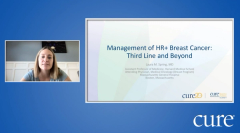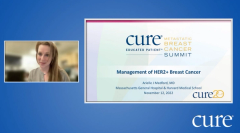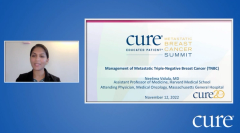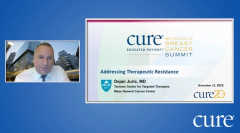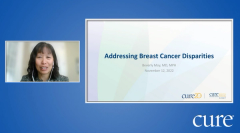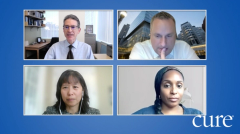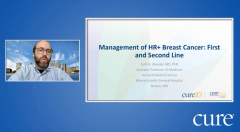
Educated Patient® Metastatic Breast Cancer Summit HER2 and Triple-Negative Disease Panel: November 12, 2022
Watch Dr. Aditya Bardia, Dr. Arielle J. Medford and Dr. Neelima Vidula answer questions about HER2 and triple-negative disease during the CURE Educated Patient Metastatic Breast Cancer Summit.
The panel was moderated by Dr. Aditya Bardia, director of breast cancer research at Mass General Cancer Center, and included Dr. Arielle J. Medford, senior medical oncology fellow at Massachusetts General Hospital/Dana Farber Cancer Institute, and Dr. Neelima Vidula, assistant professor of medicine at Harvard Medical School and attending physician of medical oncology at Harvard Medical School and Massachusetts General Hospital.
Bardia: The first question is for Dr. Medford. And that relates to the HER2 definition. If a patient has borderline HER2, which means 2+ by IHC, but not 3+, is that considered HER2 positive? And can the patient still try medications meant for HER2-positive disease?
Medford: Yeah, that's a great question. So technically, the 2 +/-, it's an in between, that's the equivocal IHC score that we think about. And so that's when we then look at the DNA itself and look for the HER2 gene. … So to technically be HER2 positive, you would need to have a sufficient copy, we talked about more than six copies of the gene or more. We use a ratio with another gene to say that that ratio shows that it's sufficiently high to be HER2 positive. Now, that being said, I know earlier, when we were talking about HER2 low, if a tumor is FISH negative, then this kind of evolving definition of HER2 low. And so the drug that we know works very well in that setting is (Enhurtu [trastuzumab deruxtecan]) as treatment for HER2-positive disease. But in the setting of hormone receptor-positive or triple-negative (disease), if a patient has HER2 low currently in the metastatic disease setting, that is an option as a later line form of therapy, and we anticipate it's probably going to move sooner with further study. So great question.
Bardia: Absolutely. Lot of interests with these antibody drug conjugates. They are questioning the current classification of breast cancer and it does get confusing. So continuing on the therapy theme, this is for Dr. Vidula on metastatic triple-negative breast cancer from a patient, is there any cure for metastatic triple-negative breast cancer? And what are the therapies that can be utilized in this setting?
Vidula: Thank you so much for your question. Unfortunately, at this time, advanced triple-negative breast cancer metastatic, stage 4 disease is still felt to be incurable. But I would think of it more as a chronic disease. One that you will potentially have to be on a treatment for a certain amount of time, when things unfortunately grow, you'll switch to a different treatment. So it's kind of like having diabetes, for example, where you stay on a treatment for a while. And then, with time, when things continue to progress, you switch to a different treatment and so forth. So that's typically how we tend to think about this disease. However, I will say that many of the treatments that have been developed in the past few years, this is a rapidly evolving field, such as the ones that I mentioned, and there's several others in development to have really impacted outcomes.
We're seeing improvements in overall survival and progression-free survival for patients. So this is a game changer for patients, Certainly in order to continue to make progress in this field, we need patients to participate in clinical trials, and to consider participating because that allows us to, in a controlled manner, evaluate some of these new therapies that are coming forward. But there's certainly a lot of exciting therapies in the pipeline, looking at new approaches. And I think that some of the molecular profiling strategies that have been employed in the past few years have actually led to these breakthroughs in the field.
Bardia: Yeah, absolutely. And many times it's through clinical trials, you can have access to these cutting edge drugs, so it becomes an access issue as well. So that's a great point. Another question on triple-negative breast cancer for Dr. Vidula, this is related to the frequency or the incidence of triple-negative breast cancer, I feel like we are seeing an increase in triple-negative breast cancer. Do you agree? And if so, why that might be the case?
Vidula: So traditionally, we've thought of triple-negative breast cancer for accounting for about 15% to 20% of patients that develop breast cancer. I don't know that we're necessarily seeing an increase in the number of cases. I think what may be happening is that we are getting more sophisticated in how we are characterizing breast tumors and how pathologists are evaluating expression of estrogen progesterone and HER2 receptors. I think that what we are learning and seeing more in breast cancer as a field just in general is that perhaps our classic definitions of hormone receptor positive, HER2 positive and triple-negative breast cancer may not be the best way to be looking at breast cancer as a whole. And that rather looking at molecular targets and genomic profiling might actually be the way of the future. So I think that what we're seeing, for example, in this new classification of tumors as HER2 low, is that there are new ways to look at the same tumor subtype definitions. And I think that the exciting part of that is that we're actually finding that we can develop therapies in some of these newly defined subtypes.
Bardia: Yeah, absolutely. And that's a good segue, actually to the next question. And that's for both Dr. Vidula and Dr. Medford, could you explain what genomic is versus germline in terms of alterations? And the second part is would you recommend tumor genotyping for triple negative and HER2-positive metastatic breast cancer?
Vidula: Well, thank you so much for that question. So you know, I touched upon this a little bit in my talk, the difference between a germline mutation and a somatic mutation has to do with what's the trigger for the mutation. So a germline mutation is one that you are born with, that's passed on from relatives, your parents to you, potentially. For example, in the BRCA setting, that's something that we can see in about 5% to 10% of patients. So it's important for patients to have genetic testing if they have advanced triple-negative breast cancer or hormone receptor-positive, HER2-negative disease, because we have the FDA approval of two PARP inhibitors in that setting.
As for the second piece of that question, genomic mutations or mutations that are acquired by the tumor, so the tumo, because of some of the prior treatments, has developed these new mutations within the tumor itself. And so these are what we termed as somatic mutations. So these can be found through a tumor genotyping assay where tumor tissue is sent to a lab for analysis of looking for some of these mutations. And also, through liquid biopsy efforts, we've actually done a lot of research on that at our institution here, where we have been able to identify a number of different mutations that are shed by the tumor into the blood and can be found in a liquid biopsy. So in terms of thinking about who should be having liquid biopsies, who should be having genomic testing of a tumor tissue sample, I think that for patients who have triple-negative breast cancer, advanced disease, that is a very reasonable consideration, because many of the clinical trials that are looking at new therapies often have a targeted therapy approach. In other words, for example, if you have a certain kind of mutation, you might be eligible for a certain kind of treatment. And so that is what's impactful. And a couple years back, we actually published a paper looking at the impact of blood-based and tumor tissue-based testing and found that patients who had both forms of these testing, it actually led to the selection of matched targeted therapy. So I think it's a very reasonable consideration and something that patients should discuss with their providers. And I'll let Dr. Medford handle the HER2 positive component of that question.
Medford: Thank you, Dr. Vidula. I obviously I think the question of the inherited germline versus the tumor-specific mutations, genomic was addressed. And then, thinking specifically about HER2-positive breast cancer germline testing, especially, certainly in patients who do have family histories, it's very reasonable to undergo germline testing. In the case of HER2-positive breast cancer and thinking of standard of care, I would say the main reason for that is to think about relatives. In situations of germline testing, HER2-positive disease is not something we typically reach for PARP inhibitors just because those cancers are much more reliant on the HER2 gene itself. And so certainly there's research underway, but there's not a standard of care that would happen from germline testing. But an inherited mutation certainly would be something to communicate to children, to siblings and so forth to help with thinking about breast cancer screening moving forward.
And then certainly other some germline mutations also predisposed to other types of cancers, non BRCA mutations that might be more associated with HER2 could be associated with other types of cancers that might mandate, for example, earlier colonoscopy is for screening and so that would be the big benefit, I would say from a the reason for doing that for genomic testing. Similarly I think because HER2 is a target and is such a driver. Anecdotally, I would say I think there are fewer studies that are looking and the absence of HER2. But what it does do is in the setting of a study, and particularly in settings like liquid biopsy like Dr. Vidula is talking about, so it doesn't require a tissue like a needle going into the tumor, but rather a simple blood test, a routine blood test. I think we're still largely in the information gathering stages on looking at what the mutational landscape is, what mutations confer not just potential actionability. But what might tell us if someone might have a mutation that's resistant to certain therapies and help guide other therapies? Again, I would say that's not standard of care right now. But it is something that we're actively researching. Because it's a great question.
We want to make more personalized decisions for patients and give patients more personalized options. And so in the HER2 setting, I'd say that's primarily more in the study phase. But I think there's a lot of reason to be hopeful for that, leading to more options for patients in the future.
Bardia: Absolutely. And we've seen things evolve over the years and newer options. So thank you both. We have time for two more questions. Quick one to Dr. Medford. This is about dual positive tumors, if one is diagnosed with HER2-positive and ER-positive disease, does that mean that every cell has excess of both receptors? Or there are different types of cell one expressing ER, the other expressing HER2?
Medford: That is a very good, very nuanced question. So it certainly could be both. I will say more typically, we think about it as if it were the same cell because the HER2 receptors are on the surface, and then the estrogen receptors live more inside the cell. And we do see that so we would call those triple-positive. And then I think the next obvious question is, well, how do we treat that since Dr. Spring and Dr. Wander talked about therapies targeting the endocrine receptor, and then I talked about the HER2 receptor. So I would say the general principle is, the HER2 receptor is such a driver of cancer growth that we really make sure we have some sort of therapy that's targeting the HER2 receptor in the metastatic setting. There are many scenarios where patients might also receive an endocrine therapy. Often if we started with something like trastuzumab, the (Perjeta [pertuzumab]) and the taxane, like we talked about that first upfront therapy, when you stop the taxane, when you've got to a stable space, if the patient is hormone receptor-positive, that's often a time to add on an endocrine therapy. And if there's a scenario where maybe really chemotherapy is not something that is within lines of next steps, whether it's side effects or whatever we want to make, again, joint decisions with patients. And that's always something we can discuss too. And in different settings of how we combine those, but we typically think about treating both but I will say the HER2 receptor tends to be such a driver that we want to make sure that's getting targeted, regardless of what kind of a combination arm.
Bardia: That's a good point when both are present. One is the dominant driver, which is HER2, so that definitely needs to be addressed. Final question for Dr. Vidula. This is about clinical trials. A patient asking what's the oldest age allowed in trials and maybe any final comments you want to make about clinical trials?
Vidula: So in terms of the age limit for clinical trials, it really does depend on the trial itself. So certainly speaking with your physician, or looking online for every trial. There is key eligibility criteria. But certainly a physician can help walk you through that. One of the things that we have recognized in recent years is that we need to expand our eligibility criteria for patients and give increased access to clinical trials. So one of the things that actually is being done and looked at in a lot of clinical trials nowadays is actually expanding the age limit. Often traditionally, it might go 18 and older, but sometimes people are enrolling, wanting to enroll patients who are older than that, who might be doing okay.
And I think another thing that we've actually tried to be cognizant of is how can we increase participation of various ethnic groups and racial minorities. We will be presenting a study at the upcoming San Antonio Breast Cancer Symposium where we have demonstrated that unfortunately, access to targeted therapies tends to be less in racial minorities. And I think that that's something as a field that we need to work to address these disparities. I know there's a talk on disparity by Dr. Moy later today, but I think that that's a key for clinical trials because we want to make sure that our populations are representing a very diverse population of patients in terms of clinical trials. I think they're really important for patients because they give patients the opportunity, particularly with triple-negative breast cancer, to have access to newer drugs.
And I think someone had asked earlier about ways to improve outcomes. And this is a way to potentially improve outcomes. And I will say that for all clinical trials, this drug that is being studied has data before, some level of data either in preclinical studies or earlier stage studies to support using that drug in a PNS in a given patient population. And so these are really exciting opportunities for patients to get access to a drug at the same time. They also help us as physicians and researchers to help move the needle forward. And to help change the standard of care. You know, all the studies that I presented today, they wouldn't have been made possible without patients who put their trust in their positions and trust in clinical trials. And so I would definitely encourage patients to discuss these opportunities with their patient with their physicians. I know those of us at Mass General are always happy to see patients for referrals for clinical trials. I did mention some of the exciting ones that we have ongoing at our institution.
For more news on cancer updates, research and education, don’t forget to

